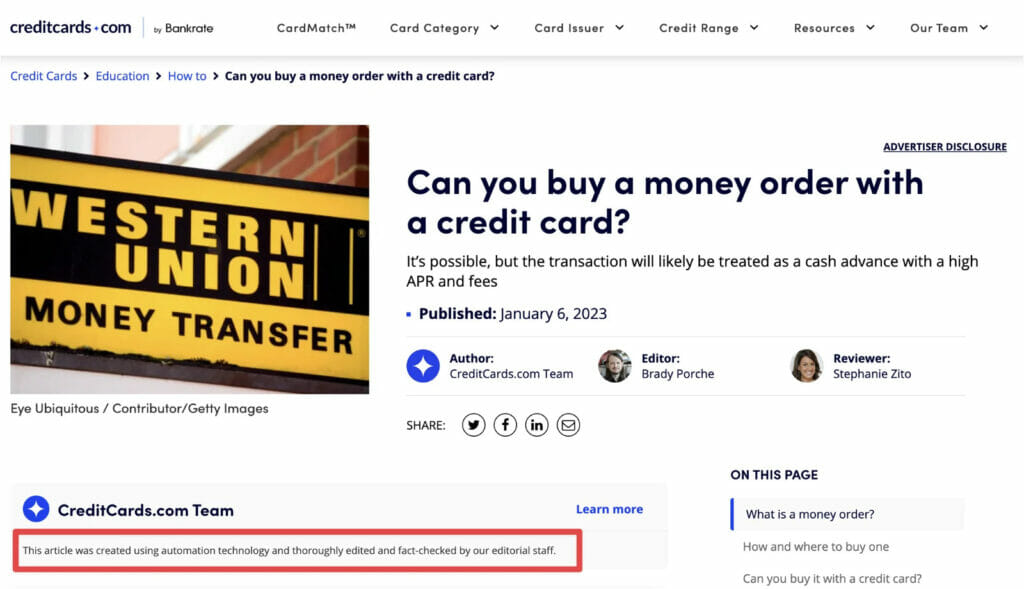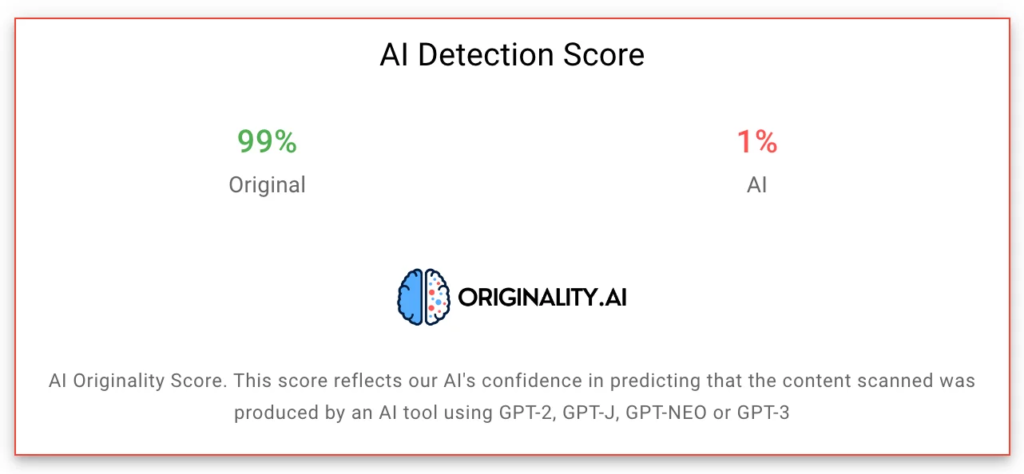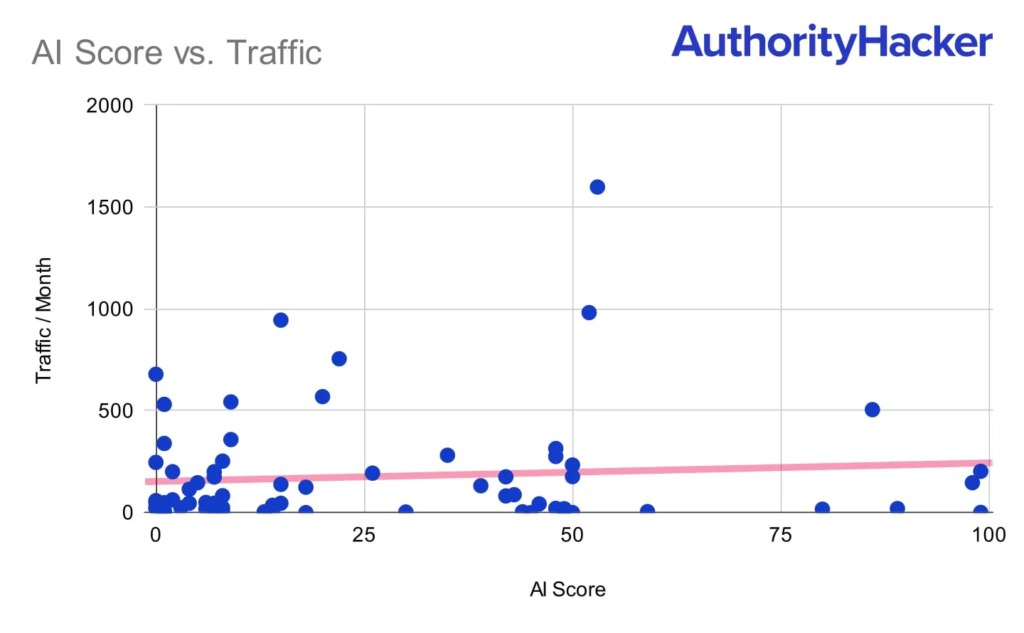It seems artificial intelligence is dirtying its hands in practically everything it seems, and journalism and curating news stories are not off limits. A collection of news publications and media outlets have reportedly been using AI to help write their posts, even in its entirety, while some others are reportedly only dabbling with it.
This realization that publications are using AI to write their articles were placed on notice in January when popular computer and tech publication CNET was discovered to be writing AI-generated posts as far back as November, 2022, but provided no formal announcement that they were doing so. Instead, the authorship would be attributed to vague titles such as “CNET Money Staff.”
Online marketer and SEO expert Gael Breton is credited for first spotting this on large scale, according to The Byte.
In a series of tweets he wrote:
It looks like the experiment started around November 11 based on publish dates.
For now, it’s a small-scale test as we only see 72 results disclosed as written by AI.
And it looks like Google is not giving a s*** about it, rewarding several of these pages with great search traffic.
Soooo.. Is AI content ok now? 🤔
I’d love to hear your thoughts below.
In the days to follow CNET issued a statement to address why they were writing articles with AI without disclosing that they are. Connie Guglielmo wrote in their address:
In November, our CNET Money editorial team started trying out the tech to see if there’s a pragmatic use case for an AI assist on basic explainers around financial services topics like What Is Compound Interest? and How to Cash a Check Without a Bank Account. So far we’ve published about 75 such articles.
The goal: to see if the tech can help our busy staff of reporters and editors with their job to cover topics from a 360-degree perspective. Will this AI engine efficiently assist them in using publicly available facts to create the most helpful content so our audience can make better decisions? Will this enable them to create even more deeply researched stories, analyses, features, testing and advice work we’re known for?
I use the term “AI assist” because while the AI engine compiled the story draft or gathered some of the information in the story, every article on CNET – and we publish thousands of new and updated stories each month – is reviewed, fact-checked and edited by an editor with topical expertise before we hit publish. That will remain true as our policy no matter what tools or tech we use to create those stories. And per CNET policy, if we find any errors after we publish, we will publicly correct the story.
Our reputation as a fact-based, unbiased source of news and advice is based on being transparent about how we work and the sources we rely on. So in the past 24 hours, we’ve changed the byline to CNET Money and moved our disclosure so you won’t need to hover over the byline to see it: “This story was assisted by an AI engine and reviewed, fact-checked and edited by our editorial staff.” We always note who edited the story so our audience understands which expert influenced, shaped and fact-checked the article.
Will we make more changes and try new things as we continue to test, learn and understand the benefits and challenges of AI? Yes.
SEE: Father Commits Suicide After AI Chatbot Encouraged Him To Kill Himself
Breton on his website Authority Hacker wanted to see if other websites were doing this as well. And the short answer is yes.
CNET is owned by a much larger company called RedVentures, and Breton noticed that other websites owned by them such as bankrate.com and creditcard.com.

Furthermore, Breton also used a tool called Originality.ai, an AI detection tool to help spot how much AI was used to curate something, though Breton admits that the tool is certainly not perfect. Nevertheless Breton says that if the detection tool registers anywhere from 40-50% and above for potential AI usage, then Breton says this is probably a good sign that AI to some degree was used in the creation process.

To test out the tool on even larger outlets, Breton said he wanted to test it on CNN per comments on Reddit that suspected a lot of their posts used AI because they are so boring and dull, they say. After searching for CNN’s most drab pieces, Breton found that CNN does indeed completely write their posts, for now anyways.

Breton also tested outlets like Forbes, and found that a lot of their ‘dull’ articles possibility contained a great deal of AI, though Breton still said that false-positives are still possible.

However, when testing internet providers and their search traffic to see if platforms owned by or searched for on these networks contained high levels of AI usage, searching for indentical pages. Breton wrote: “So with this consistency of finding a high AI % on similar pages, I think we can make the assumption that there was some AI assistance for these kinds of posts.”
My guess is that due to their highly templated nature and the chase for content uniqueness in order to try to rank better on Google, writers may be using an AI paraphrasing tool like Quillbot to rewrite sections that are common to these articles and then just insert the facts & data manually.
Breton added
Breton also found that articles using AI still seem to trend fairly normally on search engines like Google, indicating that Google does not discriminate and promotes AI content all the same.

We took all the articles that were AI bylined by Cnet, ran them into originality to determine the % of AI used in them, and then crossed the data with Ahrefs estimated traffic data to try to answer this question. You can see the original data here.
An almost flat line that means one thing: Google does NOT seem to reduce organic traffic to a piece if you use more or less AI to help you write it.
Factors like keyword selection, competition, and other traditional SEO factors matter much more than the use of AI.
Breton explained
But publications using AI are not new. The Associated Press has actually been using AI to write some of their posts since 2015, though most audiences have no idea that they are. At the time it was revealed AP using AI in around 3,000 posts per financial quarter, but was expected to increase overtime.
‘According to AI’s public relations manager James Kotecki, the Wordsmith platform generates millions of articles per week; other partners include Allstate, Comcast, and Yahoo, whose fantasy football reports are automated. Kotecki estimates the company’s system can produce 2,000 articles per second if need be,’ The Verge wrote in 2015.
But now that AI has become mainstream and expected by the general populous to play with, many other outlets are using AI to write their posts, or at least have dabbled with it.
Sky News wrote a piece titled “ChatGPT: We let an AI chatbot help write an article – here’s how it went,” where parts of the article were written by ChatGPT (as noted by the living author), while other parts were written the conventional way.
Other publications such as Fast Company, Insider, CNBC, and Gizmodo have also admitted to using AI in some instances.
AUTHOR COMMENTARY
Be not deceived: evil communications corrupt good manners.
1 Corinthians 15:33
If the Associated Press has been using AI since 2015 in large amounts, then they surely were probably dabbling with it before then; and if they were doing it, and it is hard not to believe that many others were also using AI as well to write their news.
This gives a whole new definition to “fake news.” No wonder the news we are told has gotten progressively worse and dumber this last decade: most of it is probably not even written by someone, as they rake in the money and suppress anyone that goes against the narrative they create!
Now that AI has been adopted and accepted by the masses, there is no doubt that most mainstream news we are inundated with is just fake in the truest sense of the word.
Therefore, be very careful who it is you are listening to, and trust nothing that comes from an outlet or production that gets heavy media attention and traffic.
[7] Who goeth a warfare any time at his own charges? who planteth a vineyard, and eateth not of the fruit thereof? or who feedeth a flock, and eateth not of the milk of the flock? [8] Say I these things as a man? or saith not the law the same also? [9] For it is written in the law of Moses, Thou shalt not muzzle the mouth of the ox that treadeth out the corn. Doth God take care for oxen? [10] Or saith he it altogether for our sakes? For our sakes, no doubt, this is written: that he that ploweth should plow in hope; and that he that thresheth in hope should be partaker of his hope. (1 Corinthians 9:7-10).
The WinePress needs your support! If God has laid it on your heart to want to contribute, please prayerfully consider donating to this ministry. If you cannot gift a monetary donation, then please donate your fervent prayers to keep this ministry going! Thank you and may God bless you.








PSALM 9:17
The wicked shall be turned i to hell, and all the nations that forget God.
yes this is like that stupid commercial for the poison goldfish snack i added the video
lol
“fellow robots ” lol
what a joke!
the rape of humanity , nuf said